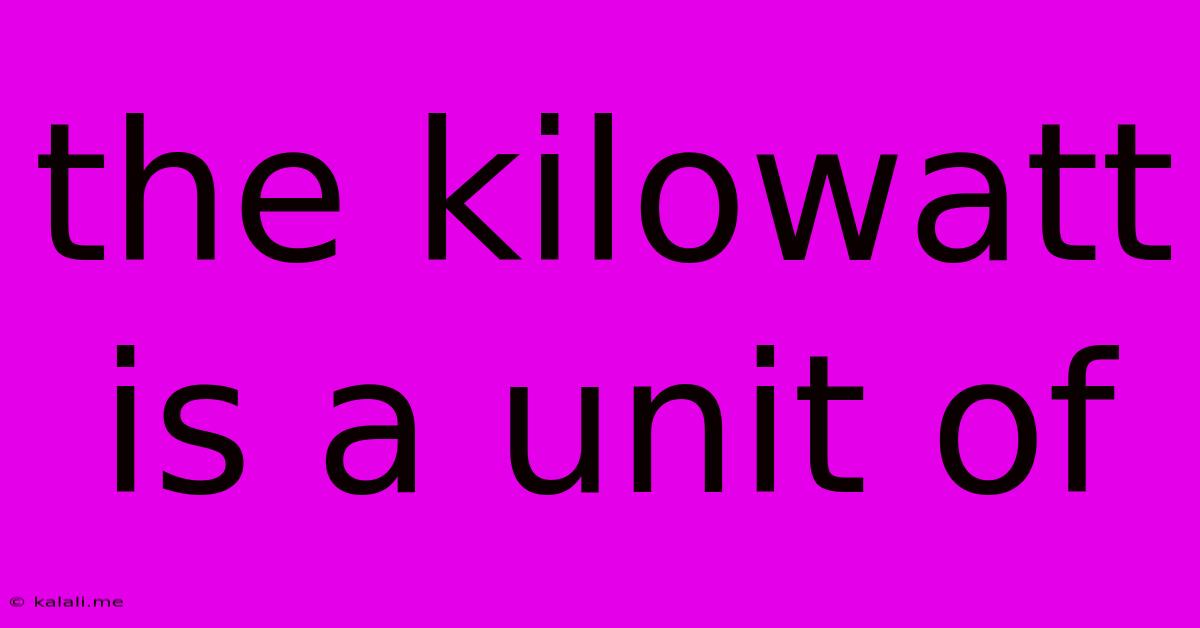The Kilowatt Is A Unit Of
Kalali
Jun 16, 2025 · 3 min read

Table of Contents
The Kilowatt: A Unit of Power
The kilowatt (kW) is a unit of power, representing the rate at which energy is transferred or converted. Understanding what a kilowatt is, and how it differs from other units like kilowatt-hours (kWh), is crucial for anyone grappling with energy consumption, electricity bills, or the power output of various devices. This article will delve into the specifics of the kilowatt, providing a comprehensive explanation for both beginners and those seeking a deeper understanding.
What is Power?
Before diving into the kilowatt, let's define power. Power is the rate at which work is done or energy is transferred. Think of it like this: a powerful engine can do a lot of work (like moving a heavy car) quickly, whereas a weaker engine will take longer to do the same amount of work. The kilowatt quantifies this rate.
Kilowatts vs. Kilowatt-hours: A Crucial Distinction
Many confuse kilowatts (kW) with kilowatt-hours (kWh). They are related but represent different things:
- Kilowatts (kW): Measure the rate of energy consumption or production. It's like the speed of a car.
- Kilowatt-hours (kWh): Measure the total amount of energy consumed or produced over a period of time. It's like the total distance traveled by a car.
For example, a 1 kW appliance uses 1 kilowatt of power. If it runs for one hour, it consumes 1 kWh of energy. If it runs for two hours, it consumes 2 kWh of energy, and so on.
Understanding Kilowatt Usage in Everyday Life
Kilowatts are used extensively to describe the power consumption of various devices and appliances:
- Light Bulbs: A typical incandescent bulb might use 60 watts (0.06 kW), while an LED bulb might use only 10 watts (0.01 kW), highlighting the energy efficiency differences.
- Appliances: Household appliances like refrigerators, washing machines, and air conditioners have power ratings in kilowatts. A powerful air conditioner might have a rating of 2 kW or more.
- Power Plants: Power plants generate electricity in megawatts (MW), which are thousands of kilowatts. This indicates the massive power output needed to supply electricity to entire cities.
- Electric Vehicles: Electric vehicle motors are also rated in kilowatts, indicating the power available for acceleration and speed.
Kilowatts and Energy Efficiency
Understanding kilowatt ratings is crucial for making energy-efficient choices. By comparing the power ratings of different appliances, you can choose the ones that consume less energy for the same task, leading to lower electricity bills and a reduced carbon footprint. Energy efficiency labels often highlight the energy consumption in kilowatts, enabling informed purchase decisions.
Beyond Kilowatts: Other Units of Power
While the kilowatt is widely used, other units of power exist, including:
- Watts (W): A smaller unit of power, where 1 kW = 1000 W.
- Megawatts (MW): A larger unit of power, where 1 MW = 1000 kW.
- Gigawatts (GW): An even larger unit of power, often used for large power plants and national grids.
In conclusion, the kilowatt is a fundamental unit of power, crucial for understanding energy consumption, production, and efficiency. Understanding the difference between kilowatts and kilowatt-hours is paramount for interpreting energy bills and making informed decisions about energy usage. By understanding the power ratings of appliances and devices, we can make more conscious choices that benefit both our wallets and the environment.
Latest Posts
Latest Posts
-
How To Create Clickable Image In Html
Jun 16, 2025
-
What Are The Factors Of 121
Jun 16, 2025
-
What Is A Theme Of The Passage
Jun 16, 2025
-
A Company That Provides Access To The Internet
Jun 16, 2025
-
Which Word Is Closest In Meaning To The Underlined Word
Jun 16, 2025
Related Post
Thank you for visiting our website which covers about The Kilowatt Is A Unit Of . We hope the information provided has been useful to you. Feel free to contact us if you have any questions or need further assistance. See you next time and don't miss to bookmark.